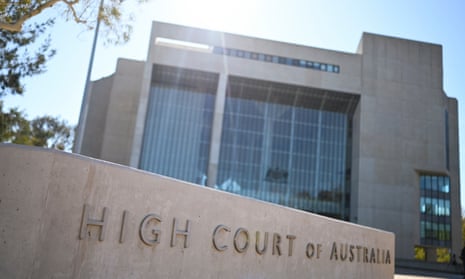In the five months since the high court delivered its landmark ruling in NZYQ, the Albanese government has introduced a patchwork of hasty and ill-considered laws that aim to skirt around an inescapable reality: that it is unlawful for governments to punish people.
Through increasingly elaborate means, the Albanese government has attempted to coerce, restrict and malign people released from immigration detention so that as many as possible accept removal from Australia.
The first chapter of the government’s misguided response commenced in November, when it made laws subjecting people released from detention to a series of punitive restrictions, including nightly curfews and electronic monitoring. For the first time, breach of those visa conditions was made a criminal offence, punishable by a mandatory minimum term of 12 months’ imprisonment.
These are restrictions to which no other visa holders in history have been subject, and far exceed the conditions of bail or parole – keeping in mind that none of the people released from detention were, in fact, serving a criminal sentence.
Then in December, the government introduced an extraordinary scheme to pre-emptively punish people for future crimes.
And again, just on Tuesday, the immigration minister, Andrew Giles, introduced yet more legislation aimed at coercing current and former detainees to accept deportation. If passed, the legislation would allow a ban on visa applications by any citizen of a “removal concern country”, effectively preventing refugees from reaching Australian shores in the first place. It would also allow the minister to designate a person a “removal pathway non-citizen” and compel them to cooperate with their removal or face up to five years’ imprisonment.
The fact that a person fears torture or death on return to their home country will not count as a reasonable excuse when it comes to bringing criminal charges. Even a person who is medically unfit to cooperate with their removal could be charged.
In less than a month, the high court will hear a challenge to the detention of an Iranian man, ASF17, who has been detained for 10 years and insists he cannot return because he will be tortured and abused because of his sexuality. Another Iranian man, AZC20, who was also detained for a decade while seeking asylum and who is medically unfit to cooperate with removal, has sought to intervene in that case.
Both these men were refused protection under the Coalition government’s “fast track” asylum determination process. That regime has been the subject of resounding criticism by various UN agencies on the basis that it deprives people of basic review and hearing rights. The “fast track” process is fundamentally skewed towards refusing claims.
This is precisely why the Labor party’s 2021 platform called for the abolition of “fast track” review, and its replacement with a “procedurally fair, simple, affordable and accessible process”. And it is why the Labor government introduced legislation in late 2023 that will finally abolish “fast track” review, with effect from 1 July 2024.
The reality is that imprisoning people for another five years will not coerce them to return to torture or death. It will only compound their suffering and create an endless roundabout between immigration detention and prison.
Indefinite detention is the cruel core of our migration and refugee policies: it is a reminder to every migrant and refugee that steps on to Australia’s shores of the fate that might await them.
The high court handed the Albanese government a defining opportunity last November, to overhaul a system that has cost people years of their lives and earned Australia international censure.
It could have affirmed the high court’s ruling and taken the time to design a process to independently review detention, allowing for people to be released into the community safely and with dignity.
Instead, the government’s chaotic and punitive response will define its term, but for very different reasons. As its most recent legislation is considered by a Senate committee over the next month, there is still time for the government to change course and to finally give people an opportunity to rebuild their lives.
